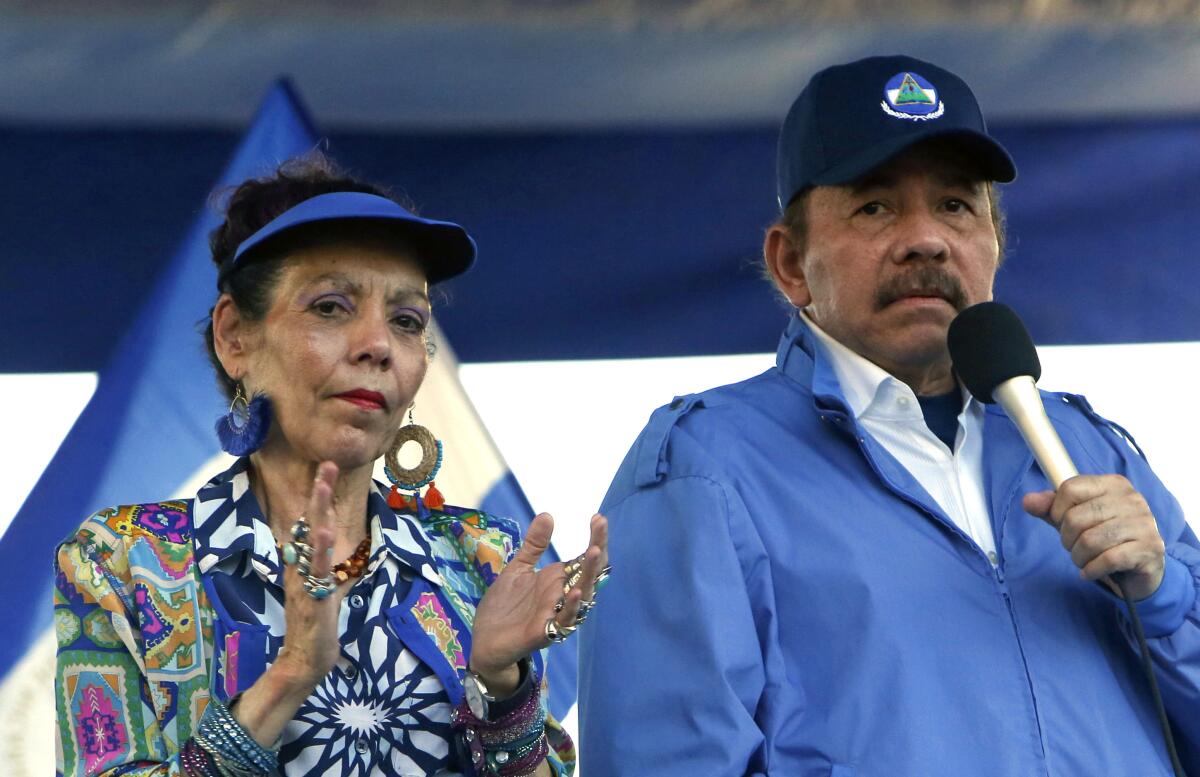Op-Ed: Daniel Ortega, the freedom fighter-turned-despot in Nicaragua, runs for reelection

- Share via
When I left my house in Nicaragua in May to visit my children abroad, a fleeting thought crossed my mind: What if I was never able to return?
Although Daniel Ortega’s regime had grown sharply more repressive and dangerous in response to a citizens revolt in 2018, I still didn’t seriously imagine that in a few months I would find myself in exile. After all, I had been a Sandinista. I joined the clandestine urban resistance of the Sandinista National Liberation Front when I was 20 and knew Ortega and his now-wife Rosario Murillo during the years we were together in the revolutionary armed struggle that toppled the Somoza dictatorship in 1979.
Much as I disliked the man Daniel Ortega had become in the years since then, which led me to resign from the Sandinista party in 1993, I thought there were some red lines he wouldn’t cross. It’s true that hundreds of people were killed in 2018 when he cracked down on the mass protests — which began when the government imposed a 5% fee on peoples’ pensions and broadened into a nationwide revolt after snipers began shooting unarmed students. But still I hoped that after the worldwide condemnation of his bloody handling of that revolt, he would tread carefully as he faced the end of his third term and elections on Nov. 7.
That turned out to be wishful thinking. On June 2, the woman who seemed to have the best chance of beating Ortega in the election, Cristiana Chamorro, was put under house arrest, falsely accused of money laundering and other crimes. On June 5, Arturo Cruz, who had been Ortega’s ambassador to the U.S. and was also a presidential hopeful, was detained in Managua’s airport as he returned from the United States. One after another, seven presidential hopefuls were arrested and jailed. They have been kept to this day in abysmal conditions without proper access to their families or lawyers.
Then Ortega went after businesspeople, journalists, politicians, iconic Sandinista heroes, opposition leaders, former ambassadors, lawyers, students, peasant organization leaders. The country’s oldest newspaper, La Prensa, was occupied by the police and its manager was arrested.
When police came after my brother, who barely avoided capture by crossing into Costa Rica on foot, I knew that if I were to return, I would end up in jail.
When the world condemned the arrests, Ortega and Murillo, who is not just his wife but also his vice president, delivered a series of incendiary speeches. No foreign power, they asserted, would sway the will of the Nicaraguan people to punish those “vendepatrias” — the traitors who were willing to sell the national interest for the sake of the imperialist United States.
This was a new rendition of an old discourse. They were on to another of their twisted narratives, seeking to deflect anger onto the United States by reminding people of its historical meddling in Nicaraguan affairs. They knew those lies would resonate with historical truths, even though the U.S. has changed its tune vis-a-vis Nicaragua in the last decade and even sent millions of dollars in aid to the Ortega government until the 2018 crackdown.
Ortega and Murillo denounced the 2018 rebellion as a coup, orchestrated by the U.S. But in fact the spontaneous, widespread insurrection shattered the illusion that under their rule Nicaragua had become a Panglossian “best of possible worlds.” The revolt was a blow to their egos. It unleashed the vengeful, sick and cruel dark side of their personalities. Even for former Sandinistas like me, who know the unscrupulous contortions and concessions they made to regain and remain in power, it has been appalling to watch the extent of their fury and revenge.
Others, especially in the Latin American and European left, have chosen to believe their lies. Ortega came to represent the romanticism of the Sandinista movement that in 1979 finally ended the more than four-decade dictatorship of the Somoza family. But romantic memories cannot wipe away the recent abuses and crimes documented by the Inter-American Commission on Human Rights, the United Nations, Amnesty International and the Nicaraguan Center for Human Rights.
Ortega has now held power in Nicaragua longer than the tyrant he helped to oust. He is mimicking the behavior of the Somozas by establishing a family-run government. He and Murillo have manipulated the electoral system in their favor. Hiding behind the rhetoric of anti-imperialism, they have become, in their 70s, not so different from the people they spent their young lives fighting to oust.
Challenging times reveal people’s true personalities. Ortega, who was jailed by Somoza at 22 and freed by a Sandinista hostage-taking operation at 29, was deeply affected by the experience. It turned him into a sly loner, a man of few friends, good at intrigue and political manipulations. In 1998 his stepdaughter Zoilamerica publicly accused him of sexually abusing her from the time she was 11, only to see her mother side with her abuser.
Murillo is Ortega’s vice president, his loyal No. 2 — but she also keeps a tight circle around him, feeding the acute mistrust he developed in prison.
Together they are cementing a tyranny that has not been seen in Latin America for decades. No doubt they will be reelected on Nov. 7, since they are running virtually unopposed. The elections will be just another display of their will to power, as they grow ever more like the wicked dictators in the magical realism novels of the region.
Gioconda Belli is a Nicaraguan poet and novelist. She has been president of PEN Nicaragua.
More to Read
A cure for the common opinion
Get thought-provoking perspectives with our weekly newsletter.
You may occasionally receive promotional content from the Los Angeles Times.









